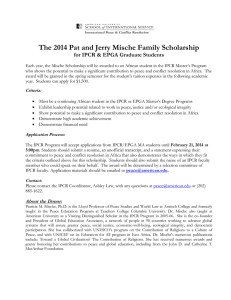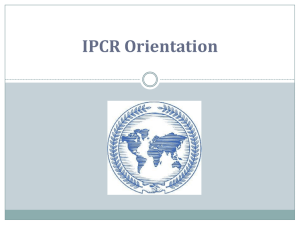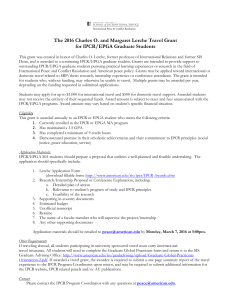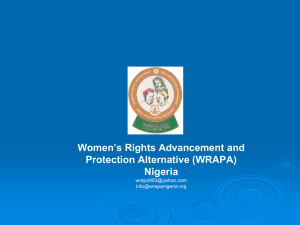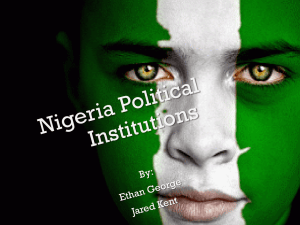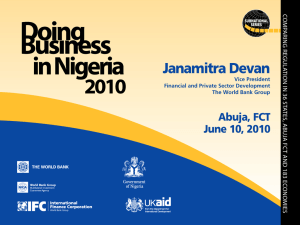Read - Institute for Peace and Conflict Resolution
advertisement
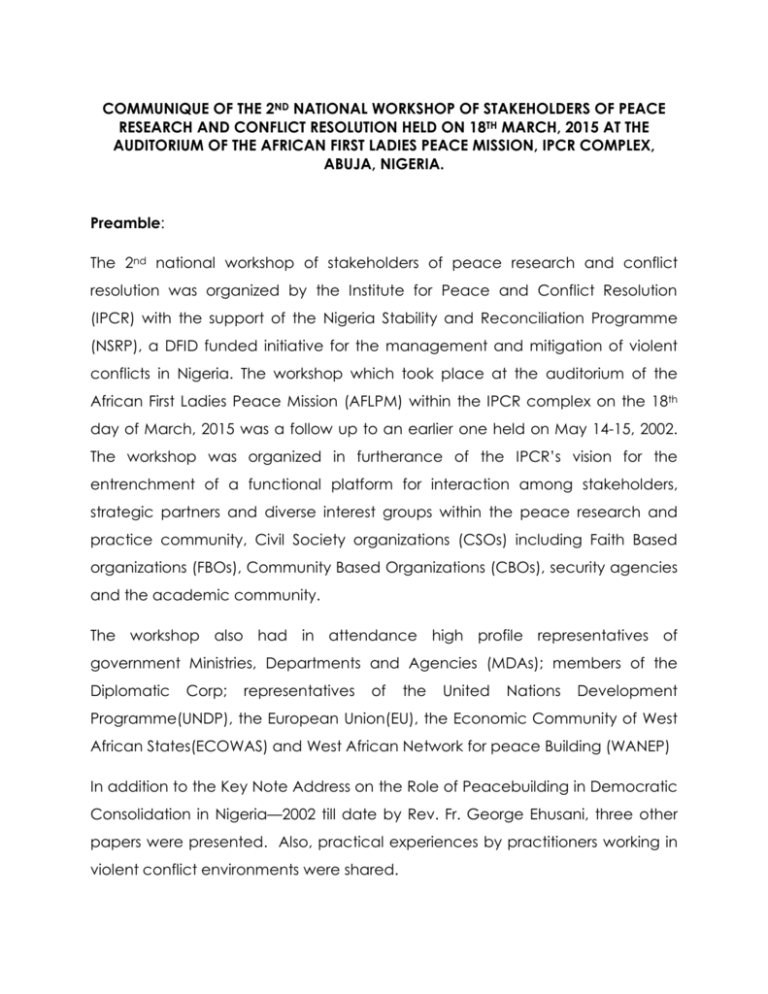
COMMUNIQUE OF THE 2ND NATIONAL WORKSHOP OF STAKEHOLDERS OF PEACE RESEARCH AND CONFLICT RESOLUTION HELD ON 18TH MARCH, 2015 AT THE AUDITORIUM OF THE AFRICAN FIRST LADIES PEACE MISSION, IPCR COMPLEX, ABUJA, NIGERIA. Preamble: The 2nd national workshop of stakeholders of peace research and conflict resolution was organized by the Institute for Peace and Conflict Resolution (IPCR) with the support of the Nigeria Stability and Reconciliation Programme (NSRP), a DFID funded initiative for the management and mitigation of violent conflicts in Nigeria. The workshop which took place at the auditorium of the African First Ladies Peace Mission (AFLPM) within the IPCR complex on the 18th day of March, 2015 was a follow up to an earlier one held on May 14-15, 2002. The workshop was organized in furtherance of the IPCR’s vision for the entrenchment of a functional platform for interaction among stakeholders, strategic partners and diverse interest groups within the peace research and practice community, Civil Society organizations (CSOs) including Faith Based organizations (FBOs), Community Based Organizations (CBOs), security agencies and the academic community. The workshop also had in attendance high profile representatives of government Ministries, Departments and Agencies (MDAs); members of the Diplomatic Corp; representatives of the United Nations Development Programme(UNDP), the European Union(EU), the Economic Community of West African States(ECOWAS) and West African Network for peace Building (WANEP) In addition to the Key Note Address on the Role of Peacebuilding in Democratic Consolidation in Nigeria—2002 till date by Rev. Fr. George Ehusani, three other papers were presented. Also, practical experiences by practitioners working in violent conflict environments were shared. Observations: The participants deliberated on the various presentations and observed that: 1. The first national workshop of stakeholders of peace research and conflict resolution held in 2002 was a ground-breaking effort which greatly impacted the peace research community within Nigeria, the sub-region and beyond; 2. The great work of IPCR in producing the draft National Peace Policy (NPP) and Strategic Conflict Assessment(SCA) has been of great benefit and was much appreciated by peace researchers; 3. Conflict research, such as conducted in the SCA, is crucial to the development of a functional peace and security framework; 4. There is need for more empirical research on peace and conflict issues 5. It is imperative that research endeavors should focus on the promotion of synergy among stakeholders; 6. Peace research should also address political factors and other governance that cause conflict within the country 7. Peace research should address the challenges of Early Warning Systems (EWS); 8. Successive governments have not addressed the structural imbalances inherent in the Nigerian constitutional arrangement; 9. Virtually every social and political demographic constituting the Nigerian state is aggrieved over perceived injustices; 10. The prevalence of national insecurity is undermining human security and threatening the conduct of peace research; 11. The youth population, the most marginalized within the country is aggrieved because of what it sees as the deliberate neglect of its interests. 12. Organic modern states are informed and anchored on values of sound moral orientation; 2|Page 13. Peace- building is an activity that both state and non-state actors carryout in a complementary manner; 14. The national infrastructure for peace could be achieved through sound multi-actor partnerships to be led by the IPCR; 15. There is urgent need for more funding for peace building and peace research; 16. The introduction of Peace Studies and Conflict Resolution into the curriculum of tertiary institutions is a welcome development towards a culture of peace in the country; 17. The IPCR’s research mandate in peace and conflict resolution makes it an important player in peace policy formulation and implementation of the national integration and diversity management processes of the government; 18. The IPCR is strategically positioned to drive conflict resolution and peace research in Nigeria, within the ECOWAS sub-region and Africa as a whole; Recommendations: Based on the above observations, participants recommended that; 1. injustices against individuals and cultural groups across the country should be addressed as a matter of urgency; 2. to overcome the challenges of insecurity in the country, it is imperative that a national peace infrastructure should be instituted; 3. peace practitioners and researchers should focus research attention on the imperative of good governance and an equitable structure within the country; 4. a viable youth employment and empowerment scheme should be further promoted for the meaningful engagement of the youth; 5. The national government must commit reasonable resources through the budgetary process for effective programmes on issues of peace building and conflict prevention; 3|Page 6. Funding partners must make long term commitment so that the peace research and peace building process could be sustained; 7. Peace research should address the challenges of ensuring adequately operational Early Warning Systems (EWS) and initiating timely responses to Early Warning signals; 8. Peace Research should also be deployed to the Study of Traditional Methods of peace and conflict resolution; 9. There is need for government to further deepen and institutionalize peace research in the country through its national planning processes; 10. Peace research should address the challenges of adequate operationalization and harmonization of existing Early Warning Systems (EWS); building capacities for generating timely responses; 11. Government should invest in building capacity in peace research at all levels; 12. Government should facilitate the access of strategic research institutions such as IPCR to TETFUND research grant; 13. IPCR should enter into strong partnership with other stakeholders like universities and think tanks to deepen peace research in the country; 14. Government should endeavor to take ownership of peace building by committing to the peace research efforts in policy making and funding; 15. There is urgent need for government to approve the draft National Peace Policy (NPP) already before it; 16. An Early Warning and Response hub focusing on peace and conflict issues should be developed urgently; 17. There is a great need for synergy between all stakeholders, particularly the security agencies and the peace practitioners; 18. The private sector should be considered as important source of funding for peace research and peace- building activities of the IPCR; 19. IPCR should provide leadership in peace research and manage the programming details for the infrastructure for peace in Nigeria; 4|Page 20. The IPCR should ensure that the workshop of stakeholders of peace research and conflict resolution is organized regularly for the purposes of cross fertilization of ideas and experience-sharing ons the most proactive strategies for building peace and resolving conflicts. 21. The SCA should be updated more regularly to provide ready-to-use conflict data on Nigeria. 5|Page
